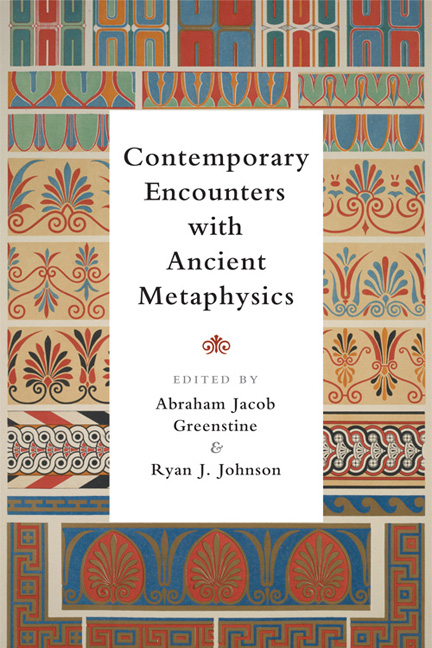Book contents
- Frontmatter
- Contents
- Acknowledgements
- Note on the Text
- Notes on Contributors
- 1 A Thousand Antiquities
- Part I Plato
- Part II Aristotle
- 7 Science Regained [1962]
- 8 Aristotle's Organism, and Ours
- 9 Does It Matter? Material Nature and Vital Heat in Aristotle's Biology
- 10 The Modern Aristotle: Michael Polanyi's Search for Truth against Nihilism
- 11 Diverging Ways: On the Trajectories of Ontology in Parmenides, Aristotle, and Deleuze
- 12 Object and Οὐσία: Harman and Aristotle on the Being of Things
- Part III Epicureans, Stoics, Skeptics, and Neo-Platonists
- Part IV Postscript
- Index
11 - Diverging Ways: On the Trajectories of Ontology in Parmenides, Aristotle, and Deleuze
from Part II - Aristotle
- Frontmatter
- Contents
- Acknowledgements
- Note on the Text
- Notes on Contributors
- 1 A Thousand Antiquities
- Part I Plato
- Part II Aristotle
- 7 Science Regained [1962]
- 8 Aristotle's Organism, and Ours
- 9 Does It Matter? Material Nature and Vital Heat in Aristotle's Biology
- 10 The Modern Aristotle: Michael Polanyi's Search for Truth against Nihilism
- 11 Diverging Ways: On the Trajectories of Ontology in Parmenides, Aristotle, and Deleuze
- 12 Object and Οὐσία: Harman and Aristotle on the Being of Things
- Part III Epicureans, Stoics, Skeptics, and Neo-Platonists
- Part IV Postscript
- Index
Summary
ONLY ONE ONTOLOGY?
Presently there is a flood of ontologies, an uproar over being. Not only is metaphysics permitted, it has become, perhaps, expected. Not that continental philosophy has returned to some sort of Wolffian systematic science of ontology. Rather, we now find ourselves inundated by a variety of ontological styles: it seems that every philosopher and scholar has their own theory of being. To make our way through this torrent, we might ask: what is ontology? How can we speak of being? Can it be narrated, accounted for, expressed?
In this essay I explore three philosophically and historically decisive answers to these questions: those of Parmenides, Aristotle, and Gilles Deleuze. I examine not only what each thinker says about being, but also how they say it, that is, what the project of ontology is for each. Rather than proposing so many different hypotheses in a single pre-established discourse on being, each of them endeavors to create a new ontology. Parmenides inaugurates ontology, leading us on a journey to the truth through the path of what is. Aristotle, rejecting Parmenides’ way of truth, instead proposes a knowledge of being, a science of ontology, which leads in turn to knowledge of the divine as the first causes of things. Deleuze, denying both the truth of Parmenides and the first causes of Aristotle, instead contends that there is only one proposition about being, just a single voice of ontology. Path, knowledge, and proposition: each philosopher institutes his own ontological style. Each defends an ontology apparently unassimilable to the others.
To better motivate this topic, let us begin by considering Deleuze's Difference and Repetition, one of the crucial texts of (and behind) contemporary metaphysics. In this work, Deleuze notoriously proposes that “Being is univocal.” In contrast to any theory which postulates various categories of things, the univocity of being (that is, the claim that being is univocal) implies that everything is said to be in one and the same way. Deleuze links this univocity with his attempt to think difference in itself, to conceptualize difference without subordinating it to some prior identity.
- Type
- Chapter
- Information
- Contemporary Encounters with Ancient Metaphysics , pp. 202 - 223Publisher: Edinburgh University PressPrint publication year: 2017



